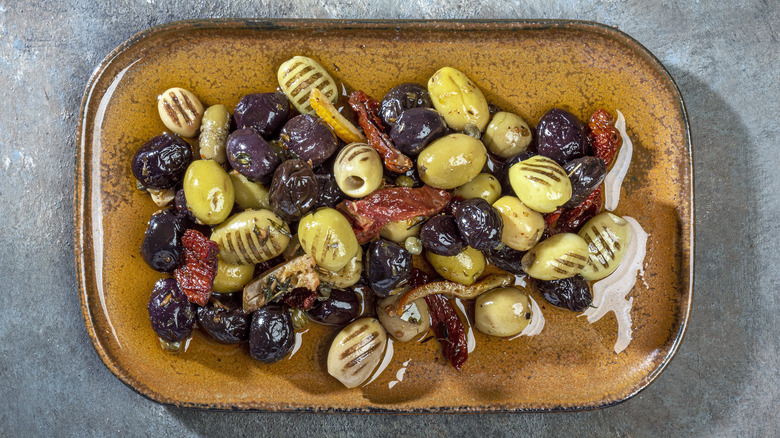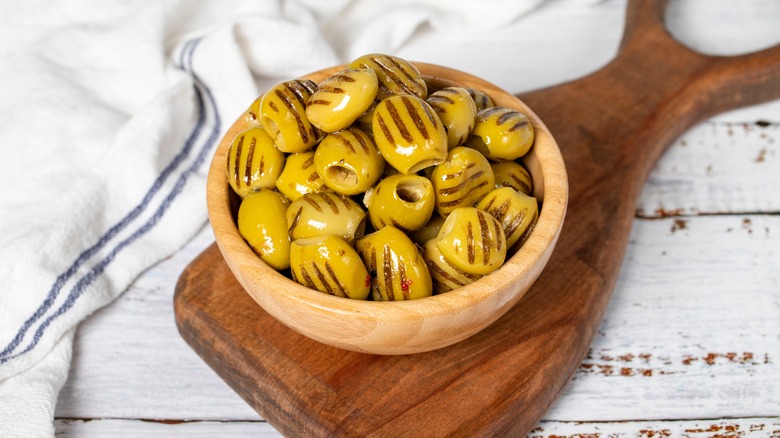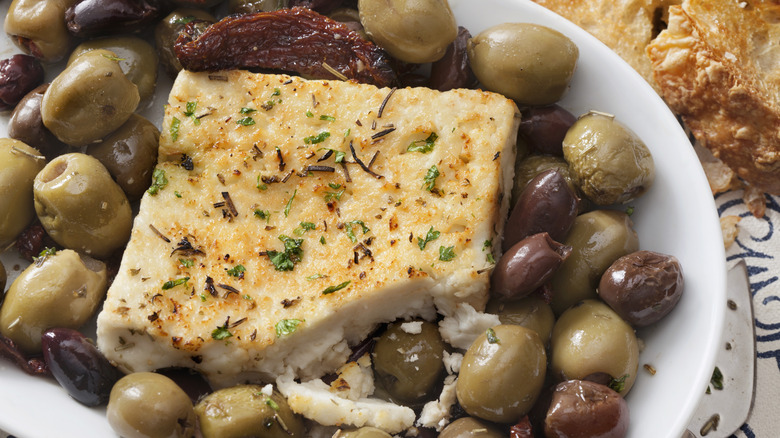Grilled Olives Are A Tiny Appetizer That Packs A Ton Of Flavor
If entrees are a dinner's main event and dessert is the standing ovation, then appetizers are the opening act. Although show openers aren't the centerpiece of an affair, they play a pivotal role in the mood setting, and a lackluster opening act can turn an eager crowd into an apprehensive one. A good opening act is electrifying and stimulating but never overpowering; the same goes for appetizers. Enter supper's finest opening act — grilled olives.
While marinated olives are a classic hors d'oeuvre, grilled olives elevate the presentation of these salty little bites. They develop a smoky, charred dimension that you can taste as much as you can smell. But it's not just the flavor and aroma of olives that's deepened by grilling them — it also enhances the texture. Grilled olives develop a crispy char on the outside, giving way to a juicy, soft interior that defines a batch of great olives. And because they have a lower water content than water-dense greens like zucchini and tomatoes, they hold their shape on the grill.
To keep these bite-sized appetizers from falling between the grill grates, skewer them like kababs to stabilize them. If you don't have skewers, grilling them in a baking dish or on top of a sheet of foil will prevent them from falling into the grill. If you want to develop a nice crusty exterior with those quintessential grill lines, opt for a method that facilitates direct contact with the grill.
Grilling olives without a grill
As useful as they are, not every foodie has a grill in their backyard. But don't panic; you can still achieve a grilled olive effect without a proper charcoal grill. The first line of fire is your oven's broiler setting. Both grills and broilers cook food at around 500 degrees Fahrenheit, and broilers function like an inverted grill, heating food from the top down rather than from the bottom up. The major difference between grilling and broiling olives is that the broiler setting won't give them grill lines or that must-have smoky flavor. However, it's nothing a little liquid smoke can't fix.
Use a cast iron grill pan to give olives crusty char and grill lines. The ridges on its surface will mimic the lines of a grill, giving you a more authentic grill alternative. Again, don't forget the liquid smoke! If all else fails and you're craving that authentic grill appeal, consider checking your local public parks for access to community grills.
Pairing and jazzing up grilled olives
Grilled olives are a luxurious finger food on their own. But if you're enjoying them as the precursor to an entree, some main courses are a match made in culinary heaven for smoky olives. The versatility of grilled olives allows for endless flavor combinations. Plus, if you want to add even more depth of flavor, you can introduce some simple fixings to give the dish some extra pizzazz.
Lemon, lime, or even grapefruit zest can give grilled olives a citrus-froward depth that uplifts the hefty smokiness of the dish. To give the earthy, brackish flavor of grilled olives a layer of creamy richness, grill them with feta cheese for a lush, tangy touch. Topping them with toasted pine nuts will give the olives a layer of buttery, nutty decadence and a subtle yet present textural contrast between the crunchy seeds and soft, meaty flesh. Put all these together, and your grilled olives will never taste better.
With a one-of-a-kind appetizer like grilled olives, you'll need an entree that complements the taste and spirit of these bite-sized simplicities. Olives are a staple in Mediterranean cuisine, so look to main courses like grilled fish topped with a Greek yogurt dressing and a drizzle of oil olive or lamb kebabs with creamy homemade hummus. Olives are also popular in Italian cuisine, so a lemony linguine or saucy, ground meat spaghetti is another excellent entree to serve after enjoying grilled olives, sparking your culinary creativity.


